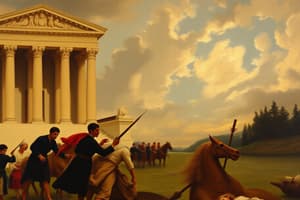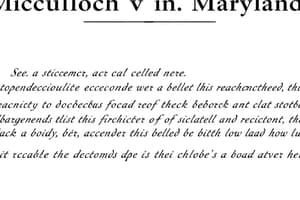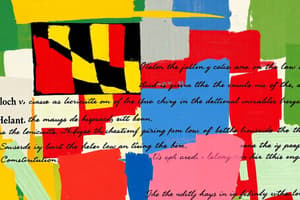Podcast
Questions and Answers
Explain how the ruling in Marbury v. Madison influenced the Supreme Court's role in the U.S. government.
Explain how the ruling in Marbury v. Madison influenced the Supreme Court's role in the U.S. government.
The Supreme Court established itself as a co-equal branch of government.
List three specific powers granted to Congress as outlined in Article 1, Section 8 of the Constitution.
List three specific powers granted to Congress as outlined in Article 1, Section 8 of the Constitution.
Taxing, regulating commerce, and maintaining an army.
What is the significance of the Necessary and Proper Clause (Article 1, Section 8) and what is another name for this is?
What is the significance of the Necessary and Proper Clause (Article 1, Section 8) and what is another name for this is?
It grants Congress the authority to make laws necessary to execute its powers; the Elastic Clause
Compare and contrast Hamilton's and Jefferson's views on the constitutionality of a national bank.
Compare and contrast Hamilton's and Jefferson's views on the constitutionality of a national bank.
Provide two reasons why the Second Bank of the United States was unpopular.
Provide two reasons why the Second Bank of the United States was unpopular.
What action did Maryland take that led to the McCulloch v. Maryland case, and what was the goal of the action?
What action did Maryland take that led to the McCulloch v. Maryland case, and what was the goal of the action?
Summarize the central legal questions presented to the Supreme Court in McCulloch v. Maryland.
Summarize the central legal questions presented to the Supreme Court in McCulloch v. Maryland.
How did the Supreme Court use the Necessary and Proper Clause to justify Congress's authority to establish a national bank?
How did the Supreme Court use the Necessary and Proper Clause to justify Congress's authority to establish a national bank?
Describe the test the Supreme Court devised to determine if an act of Congress fit within the Necessary and Proper Clause.
Describe the test the Supreme Court devised to determine if an act of Congress fit within the Necessary and Proper Clause.
Explain the role of the Supremacy Clause (Article 6) in the McCulloch v. Maryland decision.
Explain the role of the Supremacy Clause (Article 6) in the McCulloch v. Maryland decision.
What did Chief Justice Marshall mean by the statement 'the power to tax is the power to destroy'?
What did Chief Justice Marshall mean by the statement 'the power to tax is the power to destroy'?
Explain why the Supreme Court rejected Maryland's attempt to tax the Second Bank of the United States.
Explain why the Supreme Court rejected Maryland's attempt to tax the Second Bank of the United States.
In McCulloch v. Maryland, why did the state of Maryland believe it had the power to tax the national bank?
In McCulloch v. Maryland, why did the state of Maryland believe it had the power to tax the national bank?
How did the McCulloch v. Maryland decision affirm the concept of implied powers within the U.S. Constitution?
How did the McCulloch v. Maryland decision affirm the concept of implied powers within the U.S. Constitution?
Considering the historical context, why was the issue of state versus federal power so contentious during the time of McCulloch v. Maryland?
Considering the historical context, why was the issue of state versus federal power so contentious during the time of McCulloch v. Maryland?
Provide an example of how the Necessary and Proper Clause has been used in a Supreme Court case other than McCulloch v. Maryland.
Provide an example of how the Necessary and Proper Clause has been used in a Supreme Court case other than McCulloch v. Maryland.
What specific enumerated power did Congress use as the basis for establishing the Second Bank of the United States?
What specific enumerated power did Congress use as the basis for establishing the Second Bank of the United States?
Explain how Marshall's interpretation of the Constitution in McCulloch v. Maryland reflects a philosophy of loose constructionism.
Explain how Marshall's interpretation of the Constitution in McCulloch v. Maryland reflects a philosophy of loose constructionism.
How did the court define 'necessary' in the Necessary and Proper Clause?
How did the court define 'necessary' in the Necessary and Proper Clause?
In the Supreme Court ruling, what question did the court ask around whether the National Bank was within the scope of the Constitution?
In the Supreme Court ruling, what question did the court ask around whether the National Bank was within the scope of the Constitution?
Flashcards
Enumerated Powers
Enumerated Powers
Specific powers granted to Congress, listed in Article 1, Section 8 of the Constitution.
Necessary and Proper Clause
Necessary and Proper Clause
Clause in Article 1, Section 8 that grants Congress the authority to make laws necessary to execute its powers.
Alexander Hamilton's View
Alexander Hamilton's View
Argued the Necessary and Proper Clause allowed Congress to do what was “useful and convenient,” broadening national power.
Thomas Jefferson's View
Thomas Jefferson's View
Signup and view all the flashcards
War of 1812
War of 1812
Signup and view all the flashcards
Maryland's Tax Law
Maryland's Tax Law
Signup and view all the flashcards
James McCulloch
James McCulloch
Signup and view all the flashcards
Key Questions in McCulloch v. Maryland
Key Questions in McCulloch v. Maryland
Signup and view all the flashcards
Congress's Authority
Congress's Authority
Signup and view all the flashcards
Implied Powers Affirmed
Implied Powers Affirmed
Signup and view all the flashcards
Necessary and Proper Test
Necessary and Proper Test
Signup and view all the flashcards
Supremacy Clause
Supremacy Clause
Signup and view all the flashcards
"The power to tax is the power to destroy"
"The power to tax is the power to destroy"
Signup and view all the flashcards
Legacy of McCulloch v. Maryland
Legacy of McCulloch v. Maryland
Signup and view all the flashcards
Study Notes
Marbury vs. Madison's Impact
- The Supreme Court established itself as a co-equal branch of government following Marbury v. Madison.
Enumerated Powers
- Enumerated powers are specific powers granted to Congress, listed in Article 1, Section 8 of the Constitution.
- There are 17 enumerated powers, covering areas like taxing, spending, borrowing, regulating commerce, maintaining an army, copyright, and post offices.
Necessary and Proper Clause
- The Necessary and Proper Clause, found in Article 1, Section 8, grants Congress the authority to make laws necessary to execute its powers.
- This clause was central to the Supreme Court case McCulloch v. Maryland.
Hamilton vs. Jefferson on the National Bank
- In 1791, Alexander Hamilton advocated for a National Bank, sparking debate over Congress's constitutional power to create one.
- Hamilton argued the Necessary and Proper Clause allowed Congress to do what was "useful and convenient."
- Thomas Jefferson believed that "necessary" meant "vital and crucial," limiting federal power; according to him, a national bank was not vital.
- Hamilton's interpretation would broaden the power of the national government.
- Jefferson's definition would narrow the power of the federal government.
The Second Bank of the United States
- The charter for the First Bank of the United States expired in 1811.
- The War of 1812 caused financial troubles, leading Congress to charter the Second Bank of the United States.
- The idea of a National Bank was controversial and unpopular due to beliefs it violated the constitution.
- A second reason why the National Bank was unpopular is because it was in competition with other banks, including banks chartered by the states.
- The National Bank's lending practices caused financial misery to the people, leading to unpopularity.
- Suspicion/fear of the federal government becoming tyrannical contributed to the National Bank's unpopularity.
Maryland's Opposition to the National Bank
- Maryland opposed the National Bank and passed a law taxing banks not chartered by the state.
- Banks that did not have a charter or franchise from Maryland had to pay $15,000 to issue banknotes.
- The state tax law was designed to target the National Bank, making it more expensive to operate.
McCulloch v. Maryland: The Conflict
- James McCulloch, cashier of the Baltimore branch of the Second Bank of the United States, refused to pay the tax.
- Maryland sued McCulloch, and the Maryland courts ruled in favor of the state's power to tax the National Bank.
- The case reached the Supreme Court, posing questions about state vs federal government supremacy.
- The case questioned whether a state could tax the National Bank and whether Congress could even create a National Bank.
Court Arguments and Decision
- The Court argued Congress had the authority to establish a bank through the Necessary and Proper Clause, as Hamilton argued.
- Maryland argued that "necessary" meant "absolutely necessary," but John Marshall rejected this narrow interpretation.
- The Court argued that the necessary and proper clause meant "just useful to get something done" and that Congress should have a place to put money.
- The Court affirmed implied powers in the Constitution, clarifying Congress's power to make laws "necessary and proper" (convenient, helpful, expedient).
- The Court devised a test to determine if an act of Congress fit within the Necessary and Proper Clause.
- First was the act of Congress within the letter and spirit of the Constitution?
- Second, was it designed to help Congress carry out one of its enumerated powers?
- The Supreme Court ruled that there were implied powers and that the act was considered valid under the Necessary and Proper Clause
- Marshall stated, "Let the end be legitimate, let it be within the scope of the Constitution."
Supremacy Clause
- The Court relied on Article 6, Clause 2 (the Supremacy Clause), stating the Constitution and laws passed pursuant to it are the supreme law of the land.
- The Court held that states cannot contradict national policy set by Congress.
Power to Tax Implies Power to Eliminate
- Marshall declared that "the power to tax is the power to destroy."
- Maryland's tax threatened the existence of the constitutionally established bank, attempting to place the state above the federal government.
- Marshall asserted the Constitution was established by the people, not the states, requiring states to abide by it.
- The Court rejected the state's power to tax a federal entity, deeming Maryland's law unconstitutional.
Legacy of McCulloch v. Maryland
- McCulloch v. Maryland is a landmark case illustrating the Necessary and Proper Clause.
- Chief Justice Marshall predicted the debate over the extent of Congress's powers would continue.
Studying That Suits You
Use AI to generate personalized quizzes and flashcards to suit your learning preferences.




